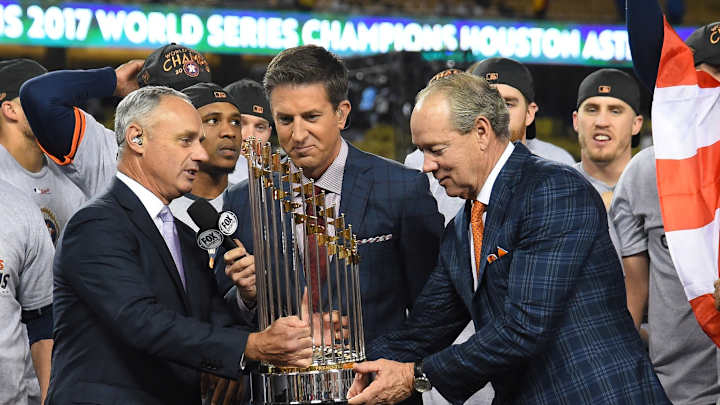MLB Owners Have Players Right Where They Want Them

Quick, don’t think; just answer. When was the last time baseball had a commissioner who didn’t cancel the World Series?
Uh, that would be 1989, when then-Commissioner Fay Vincent didn’t cancel the World Series. Thinking, “here’s an idea, let’s not cancel the World Series,” Vincent didn’t cancel the World Series again in 1990, didn’t cancel it again in 1991 and was not going to cancel it a fourth time in 1992 when the owners unceremoniously dumped the last independent person in that role in order to install one Bud Selig, of all people.
Selig managed to make it all the way to 1994 without canceling a World Series, God bless em. What a guy.
Whatever you think of Selig’s reign -- which if you care about anything other than club profits can’t be anything other than utter disdain -- lasted 22 years, and will always be remembered as the one in which an owner, sitting on an iron throne, cancelled a World Series. Because, well, he couldn’t lead his sport in any other direction.
Now that we’ve established that cancelling the World Series is a bad thing -- repeat: a bad thing, not a good thing -- let's note that Selig’s former labor lieutenant, successor, and fellow bad commissioner, Rod Manfred, is poised to become the second consecutive top man responsible for both a work stoppage and the cancellation of the World Series. Two straight. That’s quite a record. Another 55 in a row and they'll pass DiMaggio.
[Follow Sports Illustrated’s Inside the Dodgers on Twitter.]
As of Friday, also known as D-Day, Manfred and his band of merry bad flacks had the players right where they want him: sitting at home waiting to play ball. While the owners and players have each floated one semi-ridiculous to completely-ridiculous proposal -- and I suppose that’s to be expected to some extent in any negotiation -- only the owners have floated two consecutive ridiculous proposals. Great, just 55 more and they pass DiMaggio!
Here’s what’s happening: the players are ready to go and are willing to work for prorated salaries based on games played. They are not only willing, they have good reason to believe they negotiated exactly that in March.
It’s basic math; essentially half the expected salary for an 82-game season. Yes, it's true that the owners stand to lose tens of millions (and perhaps hundreds of millions of dollars) with games being played in empty stadiums. But it’s also true that the going rate for one of what is only 30 of something on the planet -- a major league franchise -- is rising exponentially, and a savvy owner can expect to recoup those losses and turn a handsome (fine, ungodly) profit come selling time. The players play or they don’t get paid. End of story. End of career for some guys.
A player has a finite number of years to ply his wares. An owner can do his thing well into her Social Security-collecting years.
While you may not be able to relate Max Scherzer’s making approximately $7 million in 2020 salary (as opposed to the expected $35,920,616), I’m sure you can sympathize with the hundreds of minor leaguers, the vast majority of whom will never get as much as a cup of coffee in the big leagues, and who make less money than most people you know, who stand to make somewhere between less than their regular salaries and absolutely nothing this summer (see Oakland, see Colorado). That’s not the major league players doing -- and in fact many are doing what they can financially to help the minor leaguers -- that’s on the owners. Completely. #Mizers
The owners are trying to back the players into a corner by employing an unthinkably-short season, saying something to the effect of, “you want your mathematically-proper prorated salaries; fine, here’s your 48-game schedule.” The longer the delay in coming to agreement, the closer the owners are to getting exactly what they want. Which is kind of like a lockout.
It’s not a lockout in the literal sense -- and some teams have facilities open as we speak -- but it serves the same purpose as a lockout. The players don't get paid and there is no baseball in June. Or July. And for all we know, August, September and October.
This is not complicated, people. The owners are the bad guys here. And their leader (and I use that term lightly), Mr. Manfred is the primary villain. And oh, what an awful baseball commissioner we have. Again.
Where have you gone, Joe DiMaggio, indeed.
Howard Cole has been writing about baseball on the internet since Y2K. Follow him on Twitter.

Howard Cole is a news and sports journalist in Los Angeles. Credits include Sports Illustrated, Forbes, Rolling Stone, LAT, OCR, Guardian, LA Weekly, Westways, VOSD, Prevention, Bakersfield Californian and Jewish Journal. Founding Director, IBWAA.